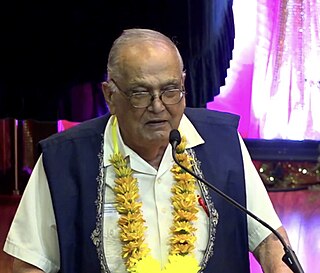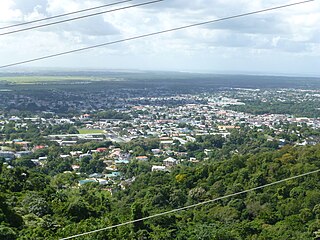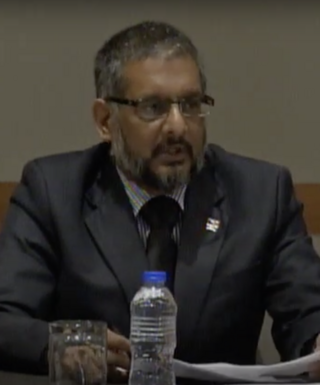
Indian Arrival Day is a holiday celebrated on various days in the nations of the Caribbean, Fiji, South Africa, and Mauritius, commemorating the arrival of people from the Indian subcontinent to their respective nations as indentured labours brought by European colonial authorities and their agents. In Guyana, Mauritius, Fiji, and Trinidad and Tobago, where it started, it is an official public holiday.

Indo-Trinidadians and Tobagonians or Indian-Trinidadians and Tobagonians are people of Indian origin who are nationals of Trinidad and Tobago whose ancestors came from India and the wider subcontinent beginning in 1845 during the period of colonization.

The Democratic Labour Party was the main opposition party in Trinidad and Tobago from 1957 till 1976. That party was the party which opposed the People's National Movement (PNM) at the time of Independence. After several splits brought about by leadership struggles, the party lost its hold on the Indo-Trinidadian community in the 1976 General Elections and was displaced in parliament by the United Labour Front under the leadership of Basdeo Panday, a former DLP senator. The party was the representative of the ethnic Indian community in the country; however Indian Muslims and Christians were said to be less loyal to the party than Indian Hindus.

Bhadase Sagan Maraj was a Trinidadian and Tobagonian politician, Hindu leader, civil rights activist, trade unionist, landowner, businessman, philanthropist, wrestler, and writer. He founded the Sanatan Dharma Maha Sabha in 1952, which grew to be the largest and most influential Hindu organization in Trinidad and Tobago and the wider Caribbean. He also founded the Caroni East Indian Association, the People's Democratic Party, the Democratic Labour Party, the Democratic Liberation Party, the Federation of Unions of Sugar Workers and Cane Farmers, and The Bomb newspaper.
The Sanatan Dharma Maha Sabha (SDMS), pronounced [sənɑːt̪ənə d̪ʰərmə məɦɑː səbʰɑː], colloquially known as the Maha Sabha, is the largest and most influential Hindu organization in Trinidad and Tobago. It operates 150 mandirs, over 50 schools, and has its own radio station, Radio Jaagriti 102.7 FM, and TV channel, TV Jaagriti. They also operate the Indian Caribbean Museum of Trinidad and Tobago. It was formed in 1952 when Bhadase Sagan Maraj engineered the merger of the Sanatan Dharma Association and the Sanatan Dharma Board of Control. An affiliated group, the Pundits' Parishad, has 200 affiliated pundits. The organisation's headquarters are located in St. Augustine.

Satnarayan Maharaj, also known as Sat Maharaj, was a Trinidadian and Tobagonian Hindu religious leader, educationalist, and civil rights activist in Trinidad and Tobago. He was the Secretary-General of the Sanatan Dharma Maha Sabha, a major Hindu organisation in Trinidad and Tobago and the wider Caribbean.
The National Awards of Trinidad and Tobago consist of:

Saint Augustine is a town in the northwest of Trinidad, Trinidad and Tobago.

Hinduism in Trinidad and Tobago is the second largest religion. Hindu culture arrived to Trinidad and Tobago in 1845, with the arrival of the first Indian indentured laborers, whom an overwhelming majority of were Hindu. According to the 2011 census there were 240,100 declared Hindus in Trinidad and Tobago.
Religion in Trinidad and Tobago, which is a multi-religious country, is classifiable as follows:
Pichakaree is an Indo-Trinidadian form of music, which originated in Trinidad and Tobago. It is named after the long syringe-like tubes used to spray abir during Phagwah celebrations.

Simbhoonath Capildeo was a prominent lawyer and politician in Trinidad and Tobago. He was the elder brother of Rudranath Capildeo and uncle of Nobel laureate Sir Vidia "V. S." Naipaul and Shiva Naipaul. He was father to two sons, Surendranath and Devendranath Capildeo and a daughter, Sita Capildeo. Capildeo was one of the founding members of the Democratic Labour Party and a member of parliament from 1956 to 1966, becoming known as "the Lion of the Legislative Council". He served as the acting Leader of the Opposition for Bhadase Sagan Maraj and Rudranath Capildeo. Capildeo was also an important leader of the Hindu community in Trinidad and played in role in the foundation of the Sanatan Dharma Maha Sabha. In 1989 he was awarded the Chaconia Gold Medal by the Trinidad and Tobago government, honoring his service to the country.
Maraj, Maharaj, Maharajh, Maragh, or Maharagh is a Hindu Indian surname derived from the Sanskrit word Maharaja meaning "great leader", "great ruler", or "great king". Originally used as an honorific suffix to a Hindu priest's name, it became the surname of many Hindu priests who immigrated to different European colonies during the Indian indenture system and their descendants because when stating their names to the respective local colonial authorities they would state their whole name and many would include the honorific suffix of Maharaj, which the authorities erroneously documented as their surname. Notable individuals bearing the surname include:
Inshan Ishmael came into the public eye with his launching of an Islamic television station in Trinidad and Tobago, the Islamic Broadcast Network, where he hosted a popular talk show, “Breaking Barriers” and for his historic court action against the state for using the Trinity Cross as the nation’s highest award. In January 2007 he again received national attention when he was arrested under the Anti-Terro.
Justice Peter Jamadar is a former Justice of Appeal in the Court of Appeal of the Republic of Trinidad and Tobago. Justice Jamadar served as a Judge in the High Court until his elevation to the Court of Appeal in 2008. As of July 4, 2019, Justice Jamadar has been a judge on the bench of the Caribbean Court of Justice.

Devant Maharaj is a Trinidad and Tobago politician, and social activist. He is a leading member of the United National Congress. On 27 June 2011, he became a member of the Senate of the Republic of Trinidad and Tobago and Minister of Transport following his appointment as Chairman of the Public Services Transport Corporation of Trinidad and Tobago.
Radio Jaagriti 102.7 FM is a 24-hour radio station in Trinidad and Tobago formed by the Sanatan Dharma Maha Sabha to broadcast Hindu religious programming and to address the needs of the Hindu community in the media.
Rampersad Parasram is the current Dharmacharya of Sanatan Dharma Maha Sabha and is a religious leader, medical doctor, and politician in Trinidad and Tobago.
TV Jaagriti is a Trinidadian and Tobagonian Hindu religious television channel, that is operated by the Central Broadcasting Services Limited, which is owned by the Sanatan Dharma Maha Sabha, a major Hindu organization in Trinidad and Tobago. It airs programming related to the Indian Hindus in Trinidad and Tobago such as religious, cultural, news, lifestyle, health, youth and political programs.









